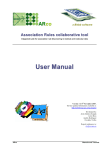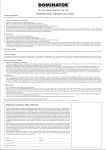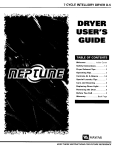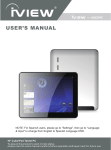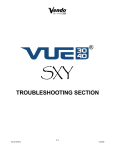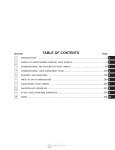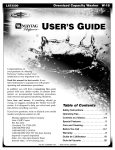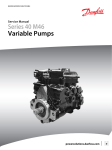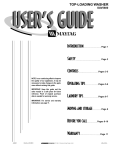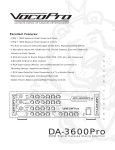Download Maytag Clothes Washer User`s guide
Transcript
LAT-2 Maytag Clothes Washer USER’S GUIDE Congratulations on your purchase of a Maytag clothes washer! Your satisfaction is very important to us. Read this manual for best results. It contains instructions to acquaint you with proper operating and maintenance procedures. In addition you will find a Laundering Tips guide packed with your clothes washer. It contains information on recommended laundering procedures, stain removal and special laundering situations. Save time and money. If something should go wrong, we suggest consulting the “Before You Call” section. It is designed to help you solve basic problems before consulting a servicer. If you have questions, write us (include your model number and phone number) or call: Maytag Appliances Sales Company Attn: CAIR® Center P.O. Box 2370 Cleveland, TN 37320-2370 1-800-688-9900 USA 1-800-688-2002 CANADA 1-800-688-2080 USA TTY (for deaf, hearing impaired or speech impaired) (Mon.–Fri., 8am–8pm Eastern Time) Internet: http://www.maytag.com Part No. 6 2306510-0502 MCS Part No. 22003922 Table of Contents Safety Instructions. . . . . . . . . . . . . . . . 1 Operating Tips . . . . . . . . . . . . . . . . . . . 2 Controls at a Glance . . . . . . . . . . . . . 3-4 Special Features . . . . . . . . . . . . . . . . . 5 Care and Cleaning . . . . . . . . . . . . . . . . 6 Before You Call . . . . . . . . . . . . . . . . . 6-7 Warranty . . . . . . . . . . . . . . . . . . . . . . . . 8 Guide de L’Utilisateur. . . . . . . . . . . . . 10 Guía del Usuario . . . . . . . . . . . . . . . . 20 ©2002 Maytag Appliances Sales Co. Important safety instructions WARNING: To reduce the risk of fire, explosion, electric shock, or personal injury when using your washer, follow basic safety precautions, including the following: 1. Read all instructions before using the appliance. 2. As with any equipment using electricity and having moving parts, there are potential hazards. To use this appliance safely, the operator should become familiar with the instructions for operation of the appliance and always exercise care when using it. 3. Do not install or store this appliance where it will be exposed to the weather. 4. Install and level washer on a floor that can support the weight. 5. This appliance must be properly grounded. Never plug the appliance cord into a receptacle which is not grounded adequately and in accordance with local and national codes. See installation instructions for grounding this appliance. 6. To avoid the possibility of fire or explosion: a. Do not wash items that have been previously cleaned in, washed in, soaked in, or spotted with gasoline, drycleaning solvents, other flammable or explosive substances as they give off vapors that could ignite or explode. Hand wash and line dry any items containing these substances. Any material on which you have used a cleaning solvent, or which is saturated with flammable liquids or solids, should not be placed in the washer until all traces of these liquids or solids and their fumes have been removed. These items include acetone, denatured alcohol, gasoline, kerosene, some liquid household cleaners, some spot removers, turpentine, waxes and wax removers. b. Do not add gasoline, dry-cleaning solvents, or other flammable or explosive substances to the wash water. These substances give off vapors that could ignite or explode. c. Under certain conditions, hydrogen gas may be produced in a hot water system that has not been used for 2 weeks or more. HYDROGEN GAS IS EXPLOSIVE. If the hot water system has not been used for such a period, before using a washing machine or combination washer-dryer, turn on all hot water faucets and let the water flow from each for several minutes. This will release any accumulated hydrogen gas. As the gas is flammable, do not smoke or use an open flame during this time. 7. Do not reach into the appliance if the tub or agitator is moving. 8. Do not allow children or pets to play on, in, or in front of the appliance. Close supervision of children is necessary when the appliance is used near children and pets. 9. Do not tamper with controls. 10. Do not repair or replace any part of the appliance or attempt any servicing unless specifically recommended in published user-repair instructions that you understand and have the skills to carry out. 1 11. Unplug power supply cord before attempting to service your washer. 12. The agitator should not be removed. If the agitator is removed, it must be replaced by pushing down completely and the locking screw tightened before the washer is operated. 13. Store laundry aids and other material in a cool, dry place where children cannot reach them. 14. Do not wash or dry items that are soiled with vegetable or cooking oil. These items may contain some oil after laundering. Due to the remaining oil, the fabric may smoke or catch fire by itself. 15. Do not use chlorine bleach and ammonia or acids (such as vinegar or rust remover) in the same wash. Hazardous fumes can form. 16. Do not machine wash fiberglass materials. Small particles can stick to fabrics washed in following loads and cause skin irritation. 17. Before the appliance is removed from service or discarded, remove the door to the washing compartment. 18. Inlet hoses are subject to damage and deterioration over time. Check the hoses periodically for bulges, kinks, cuts, wear or leaks and relpace them every five years. What you need to know about safety instructions Warning and Important Safety Instructions appearing in this manual are not meant to cover all possible conditions and situations that may occur. Common sense, caution, and care must be exercised when installing, maintaining or operating appliance. Always contact your dealer, distributor, service agent, or manufacturer about problems or conditions you do not understand. Recognize safety symbols, words, labels WARNING WARNING – Hazards or unsafe practices which COULD result in severe personal injury or death. CAUTION CAUTION – Hazards or unsafe practices which COULD result in minor personal injury. SAVE THESE INSTRUCTIONS Operating tips For detailed information on sorting, pretreating stains, etc., see the enclosed Laundering Tips pamphlet. Detergent • Use either liquid or granular laundry detergent. For best results, be sure detergent is added to the washer BEFORE the load and be sure the wash water is above 65° F. • Use the correct amount of detergent for the load size, soil level and water conditions. Use more detergent if you have hard water and very soiled loads. If you have soft water or a lightly soiled load, use less detergent. (See manufacturer’s instructions.) • Wipe up any detergent spills on the washer. Loading • Put dry, unfolded clothes loosely in the tub, up to the top row of holes for a maximum load. • Do not wrap large items like sheets around the agitator. • Mix large and small items for best circulation. Wash bulky items like blankets separately. • When laundering permanent press items or items of delicate construction, washable woolens or loosely knit items, never use less than the MEDIUM water level setting. This will minimize shrinkage, wrinkling and pulling of seams. • For best results add the detergent to the washtub before adding the load. • Close lid carefully to avoid slamming. Additional tips • If the washer stops during the spin, it may be due to an unevenly distributed load. If this happens, push in the control knob, open the lid, redistribute the load, close the lid and pull out the control knob. The spin will resume at the point it was interrupted. • The washer will pause briefly throughout each cycle. These pauses are normal. • This washer is designed so that it will not agitate or spin when the lid is open. It will, however, fill with the lid open so water is available for pretreating stains or diluting fabric softener. • If you open the lid during a cycle, the washer will stop. When the lid is closed and the control knob pulled out, the washer will continue the cycle at the point it was interrupted. 2 Controls at a glance Step 1 Select Load Size Turn the Load Size knob to the setting that matches the size of the load. If more water is needed once the fill is complete, turn the knob to reset and then to the proper setting. WATER LEVEL SETTING LOAD SIZE Super 3/4 – Full Large 1/2 – 3/4 Full Medium 1/3 – 1/2 Full Small 1/4 – 1/3 Full Mini (Select Models) 1/4 Full REMEMBER: Items must circulate freely for best results. Step 2 Select Extra Rinse (select models) Provides an additional rinse near the end of the cycle to more completely remove laundry additives, perfumes, etc. Step 3 Select Temperature Turn the Wash Rinse Temperature knob to the desired water temperatures. Follow the garment care label for best results. Use the chart at below as a guide. WASH/RINSE TEMPS Hot/Cold Warm/Warm (Select Models) 3 LOAD TYPE White and heavily soiled, color-fast items Delicate items Warm/Cold Moderately soiled, colored items; most permanent press items Cold/Cold Brightly colored, lightly soiled items; washable woolens REMEMBER: In wash water temperatures below 65° F, detergents do not dissolve well or clean well. Care labels define cold water as up to 85° F. Step 4 Select Cycle Control features vary by model. To select a cycle, push the control dial IN (off position) and turn it to the right (clockwise) until the pointer is at the number of minutes desired for the wash load. Permanent Press Cycle Regular Cycle Is designed for items requiring gentle wash action. Provides normal agitation and normal spin speeds to wash normal, sturdy fabrics. For maximum cleaning, set the dial at 18. Step 5 Start Washer • Add detergent. • Add load and close lid. • Pull out control knob to start. NOTE: Do not attempt to turn the control dial counterclockwise. Damage to the timer will result. Is designed to minimize wrinkles with a cool-down spray rinse following the wash. Gentle Cycle NOTE: The wash/spin speeds are automatically programmed to assure proper agitation and spinning for each load type. The REGULAR cycle will provide a normal wash/spin speed. PERMANENT PRESS will have a normal wash/spin speed along with a cool-down spray rinse. The GENTLE cycle will have a gentle wash and normal final spin speed. See Laundering Tips for proper washing procedures, stain removal, and special laundering situations. 4 Special features Bleach Dispenser Fabric Softener Dispenser The dispenser automatically dilutes liquid chlorine bleach before it reaches your wash load. To use, follow these steps: This dispenser automatically releases liquid fabric softener at the proper time during the cycle. To use, follow these steps: 1.Measure liquid chlorine bleach carefully, following the instructions on the bottle. 1. Pour a measured amount of desired liquid into dispense to fill line only. 2.Add the bleach to the dispenser before adding the load. Avoid splashing or over-filling the dispenser. 2. If liquid comes below line, add warm water. NOTE: NOTE: • Never pour undiluted liquid chlorine bleach directly onto the load or into the wash tub. It is a powerful chemical and can cause fabric damage, such as tearing or color loss, if not used properly. • Do not stop the washer during the first spin. This will cause the dispenser to empty too soon. • If you prefer to use color-safe, non-chlorine bleach, pour it into the wash tub with your detergent. Do not pour non-chlorine bleaches into the bleach dispenser. Pour liquid chlorine bleach into bleach dispenser. 5 • Never pour fabric softener directly on the load. It will leave spots and stains. • Use the dispenser for liquid fabric softeners only. Clean the area in and around the dispenser frequently with hot water, detergent and a soft brush. Pour liquid fabric softener into cup and dilute with warm water. Care and cleaning Turn off the water faucets after finishing the day’s washing. This will shut off the water supply to the washer and prevent the unlikely possibility of damage from escaping water. Use a soft cloth to wipe up all detergent, bleach or other spills as they occur. Clean the following as recommended: Control Panel – clean with a soft, damp cloth and glass cleaner. Do not use abrasive powders or cleaning pads. Cabinet – clean with soap and water followed with an appliance wax, if desired. Interior – hard water deposits may be removed, if needed, using a recommended cleaner labeled washer safe. Lint Filter – it is self-cleaning and requires no maintenance. The filter is located under the agitator on the bottom of the washtub. During the wash and rinse portion of the cycle, lint is collected on the filter. Then during the spin and drain the filter is cleaned automatically. Storing the washer Washers can be damaged if water is not removed from hoses and internal components before storage. Prepare the washer for storage as follows: • Select Regular, six minutes, and add one cup of chlorine bleach OR white vinegar to a full load of water without clothes. Run the washer through a complete cycle. (Do not mix bleach and vinegar in the same wash. Hazardous fumes can form.) • Turn the water faucets off and disconnect the inlet hoses. • Advance the cycle control knob to Spin and lower the drain hose to eliminate any water that may be in the drain hose. • Disconnect the washer from the electrical supply and leave the washer lid open to let air circulate inside the tub. Before you call For problem laundry solutions (i.e. fabric damage, residue, tangling) and special laundry care procedures, see the enclosed Laundry Tips brochure. Won’t Fill • Plug cord into live electrical outlet. • Check fuse or reset circuit breaker. • Turn the control knob to proper cycle and pull knob out to start the washer. If equipped with buttons, be sure they are fully depressed. • Turn both faucets on fully. • Straighten inlet hoses. • Disconnect hoses and clean screens. Hose filter screens may be plugged. Won’t Agitate • Check fuse or reset circuit breaker. • Make sure the lid is completely closed. • Turn the control knob to proper cycle and pull knob out to start the washer. If equipped with buttons, be sure they are fully depressed. • Close lid and pull knob out to start the washer. For your safety, washer will not agitate or spin unless the lid is closed. • The washer is equipped with a lid switch failure detector. If the lid switch should malfunction, the detector will stop operations for your safety. Call for service. Cont. 6 Before you call (continued) Won’t Spin or Drain • Unevenly distributed load. Redistribute the load, close the lid and pull knob out. Check for leveling. Be sure water level is acceptable for load size. • Check fuse or reset circuit breaker. • Straighten drain hoses. Eliminate kinked hoses. If there is a drain restriction, call for service. • Close lid and pull knob out to start the washer. For your safety, washer will not agitate or spin unless the lid is closed. • The washer is equipped with a lid switch failure detector. If the lid switch should malfunction, the detector will stop operations for your safety. Call for service. • Suds lock – caused by too much suds. Rewash without detergent. Use correct amount of a low-sudsing detergent. Load is Wet • The washer may have sensed an unevenly distributed load. Redistribute the load in the tub, close the lid and pull the control knob out. • A normal spin speed is recommended for heavy loads like jeans or towels. Stops • Unevenly distributed load. Redistribute the load, close the lid and pull knob out. Check for leveling. Be sure water level is acceptable for load size. • Plug cord into live electrical outlet. • Check fuse or reset circuit breaker. • Turn the control knob to proper cycle and pull knob out to start the washer. • Close lid and pull knob out to start the washer. For your safety, washer will not agitate or spin unless lid is closed. • This may be a pause or soak period in the cycle. Wait briefly and it may start. • The washer is equipped with a lid switch failure detector. If the lid switch should malfunction, the detector will stop fill operations for your safety. Call for service. Leaks Water • Make sure hose connections are tight. • Make sure end of drain hose is correctly inserted and secured to drain facility. • Avoid extended soaking – soak for 30 minutes or less. • Avoid overloading. Is Noisy • Be sure washer is leveled properly as outlined in installation manual. • Weak floors can cause vibration and walking. • Be sure rubber feet are installed on leveling legs. • Operating sounds will vary depending on agitation speed. Fills with the Wrong Temperature Water • Turn both faucets on fully. • If equipped with a temperature selector knob, be sure it is set directly on a temperature setting and not between settings. • Make sure temperature selection is correct. • Make sure hoses are connected to correct faucets and inlet connections. Be sure water supply is regulated correctly. Flush water line before filling washer. • Check the water heater. It should be set to deliver a minimum 120°F (49°C) hot water at the tap. Also check water heater capacity and recovery rate. • Disconnect hoses and clean screens. Hose filter screens may be plugged. For further assistance contact Maytag Appliances Sales Company, Maytag Customer Assistance: U.S. 1-800-688-9900 or Canada 1-800-688-2002 U.S. customers using TTY for deaf, hearing impaired or speech impaired, call 1-800-688-2080. 7 Maytag Clothes washer warranty Full One Year Warranty For one (1) year from the date of original retail purchase, any part which fails in normal home use will be repaired or replaced free of charge. Limited Warranty After the first year from date of original retail purchase, through the time periods listed below, the parts designated below which fail in normal home use will be repaired or replaced free of charge for the part itself, with the owner paying all other costs, including labor, mileage and transportation. Second Year – All parts. Third through Fifth Year – The drive motor. All parts of the solid state controls (if so equipped). Third through Tenth Year – All parts of the transmission assembly. Additional Limited Warranty Against Rust-Through Should an exterior cabinet, including the top, lid and baseframe, rust through during the one year period starting from the date of retail purchase, repair or replacement will be made free of charge. After the first and through the tenth year, repair or replacement will be made free of charge for the part itself, with the owner paying all other costs, including labor, mileage and transportation. Please Note: This full warranty and the limited warranty apply when the washer is located in the United States or Canada. Washers located elsewhere are covered by the limited warranty only, including parts which fail during the first two years. Canadian Residents This warranty covers only those appliances installed in Canada that have been listed with the Canadian Standards Association unless the appliances are brought into Canada due to transfer of residence from the United States to Canada. The specific warranties expressed above are the ONLY warranties provided by the manufacturer. This warranty gives you specific legal rights, and you may also have other rights that vary from state to state. TO OBTAIN WARRANTY SERVICE To locate an authorized service company in your area contact the Maytag dealer from whom your appliance was purchased; or call Maytag Appliances Sales Company, Maytag Customer Assistance. Should you not receive satisfactory warranty service, please call or write: Maytag Appliances Sales Company Attn: CAIR® Center P.O. Box 2370 Cleveland, TN 37320-2370 U.S. 1-800-688-9900 Canada 1-800-688-2002 U.S. Customers using TTY for deaf, hearing impaired or speech impaired, call 1-800-688-2080. When contacting Maytag Appliances Sales Company, Maytag Customer Assistance about a service problem, please include the following: (a) Your name, address and telephone number; (b) Model number and serial number (found on the back center of the control panel) of your appliance; (c) Name and address of your dealer and the date the appliance was purchased; (d) A clear description of the problem you are having. (e) Proof of purchase. What is not covered by these warranties: 1. Conditions and damages resulting from any of the following: a. Improper installation, delivery, or maintenance. b. Any repair, modification, alteration or adjustment not authorized by the manufacturer or an authorized servicer. c. Misuse, abuse, accidents or unreasonable use. d. Incorrect electric current, voltage or supply. e. Improper setting of any control. 2. Warranties are void if the original serial numbers have been removed, altered, or cannot be readily determined. 3. Products purchased for commercial or industrial use. 4. The cost of service or service call to: a. Correct installation errors. b. Instruct the user on proper use of the product. c. Transport the appliance to the servicer. 5. Consequential or incidental damages sustained by any person as a result of any breach of these warranties. Some states do not allow the exclusion or limitation of consequential or incidental damages, so the above exclusion may not apply. User’s Guides, service manuals and parts catalogs are available from Maytag Appliances Sales Company, Maytag Customer Assistance. 8









